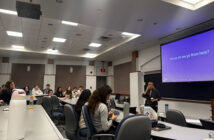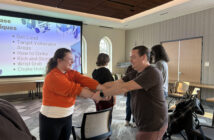During the height of the pandemic with a lot of time on my hands and access to Netflix, I went through a crime TV phase.
From procedural dramas like “Criminal Minds” to true crime documentaries such as “Abducted in Plain Sight,” I was fascinated by the stories of both the criminals and the victims.
These stories, fictional and real, made me wonder how an individual becomes a serial killer, captor or mass murderer.
I initially thought people were born either good or evil, but this opinion changed as I began watching these movies and shows—I learned that most violent criminals have had traumatic childhood experiences that, in some way, incited their criminality.
According to an article published in the peer-reviewed journal Psychiatry, Psychology and Law, “On average, 50 percent of serial killers suggest that they have experienced psychological abuse, 36 percent have experienced physical abuse, and 26 percent have experienced sexual abuse. Therefore, abuse in childhood is linked to serial killers’ later behaviors.”
I accepted this horrific truth for what it was. But then, I thought about individuals who face abuse or other hardships while growing up who don’t become killers—the blame for violent criminals’ actions cannot be placed entirely on their trauma.
This made the rationale behind why people are the way they are challenging to understand, but all the more intriguing. I related this confusion to my own life, wondering if my identity was shaped by my DNA, my childhood or a mix of the two.
“Nature versus nurture” is one of the most well-known debates in the field of psychology and is one that I find extremely interesting.
The “nature” perspective focuses on the impact biological factors have on an individual’s behavior, personality, psychopathology, cognition and temperament, while the “nurture” perspective looks at the influence of external and environmental factors.
“Nativism” refers to the extreme nature position, using genetics to explain not only one’s physical traits, but also their psychological traits. Nativists believe that individuals’ psychological traits are entirely innate.
On the flip side, “empiricism,” in this context, is the extreme nurture position. Empiricists surmise that the human mind is a blank slate when one is born, and how an individual turns out is a direct result of what they experience.
Though some researchers believe only one extreme or the other, most agree that the two sides are heavily intertwined. I agree with this majority, that nature and nurture both work to shape an individual.
According to Gene E. Robinson, director of the Carl R. Woese Institute for Genomic Biology and National Academy of Sciences member, “Inherited influences (‘nature’) include variations (polymorphisms) in DNA sequence transmitted from generation to generation over an evolutionary time scale… The environment (‘nurture’) also influences gene expression in the brain during the lifetime of an individual.”
The newest addition to the “nature versus nurture” debate is the research of epigenetics. The CDC defines epigenetics as “the study of how your behaviors and environment can cause changes that affect the way your genes work. Unlike genetic changes, epigenetic changes are reversible and do not change your DNA sequence, but they can change how your body reads a DNA sequence.”
Epigenetics accounts for the ways stress, eating habits, sleep and other external factors can lead certain genes to be more or less expressed in individuals. For example, you may be genetically predisposed to a certain physical or mental illness, but external factors will heavily influence whether or not that illness presents itself.
Studies regarding epigenetics, innate and learned behaviors, personality and numerous other topics in psychology and biology will continue for years to come. In the scientific community, however, the “nature versus nurture” debate has segued from arguments between nativists and empiricists to conversations between the two. It is clear that both nature and nurture impact one’s life, but there is no clear answer as to which is more influential or even if one is more influential.
Though my biology and many of my life experiences are out of my hands, I find it useful to try and create a healthy environment for myself physically and mentally. Who I am, and who you are, is a result of so many interwoven factors.
Try not to let one piece of your DNA or one negative occurrence define you. Identity, like most things in life, is fluid and ever changing.






Comment policy
Comments posted to The Brown and White website are reviewed by a moderator before being approved. Incendiary speech or harassing language, including comments targeted at individuals, may be deemed unacceptable and not published. Spam and other soliciting will also be declined.
The Brown and White also reserves the right to not publish entirely anonymous comments.